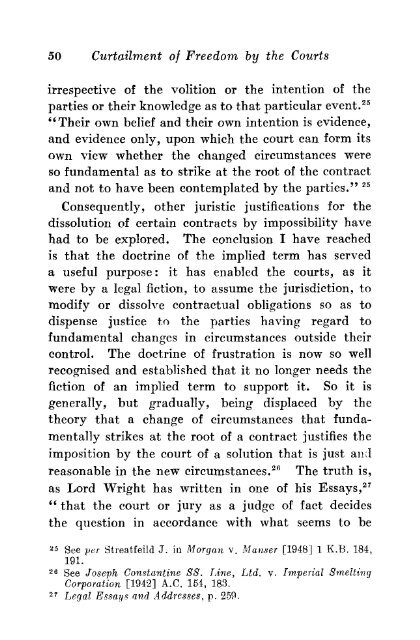The Sanctity of Contracts in English Law - College of Social ...
The Sanctity of Contracts in English Law - College of Social ...
The Sanctity of Contracts in English Law - College of Social ...
- No tags were found...
You also want an ePaper? Increase the reach of your titles
YUMPU automatically turns print PDFs into web optimized ePapers that Google loves.
50 Curtailment <strong>of</strong> Freedom by the Courtsirrespective <strong>of</strong> the volition or the <strong>in</strong>tention <strong>of</strong> theparties or their knowledge as to that particular event. 25"<strong>The</strong>ir own belief and their own <strong>in</strong>tention is evidence,and evidence only, upon which the court can form itsown view whether the changed circumstances wereso fundamental as to strike at the root <strong>of</strong> the contractand not to have been contemplated by the parties." 2SConsequently, other juristic justifications for thedissolution <strong>of</strong> certa<strong>in</strong> contracts by impossibility havehad to be explored. <strong>The</strong> conclusion I have reachedis that the doctr<strong>in</strong>e <strong>of</strong> the implied term has serveda useful purpose: it has enabled the courts, as itwere by a legal fiction, to assume the jurisdiction, tomodify or dissolve contractual obligations so as todispense justice to the parties hav<strong>in</strong>g regard t<strong>of</strong>undamental changes <strong>in</strong> circumstances outside theircontrol. <strong>The</strong> doctr<strong>in</strong>e <strong>of</strong> frustration is now so wellrecognised and established that it no longer needs thefiction <strong>of</strong> an implied term to support it. So it isgenerally, but gradually, be<strong>in</strong>g displaced by thetheory that a change <strong>of</strong> circumstances that fundamentallystrikes at the root <strong>of</strong> a contract justifies theimposition by the court <strong>of</strong> a solution that is just andreasonable <strong>in</strong> the new circumstances. 26 <strong>The</strong> truth is,as Lord Wright has written <strong>in</strong> one <strong>of</strong> his Essays, 27" that the court or jury as a judge <strong>of</strong> fact decidesthe question <strong>in</strong> accordance with what seems to be« See per Streatfeild J. <strong>in</strong> Morgan v. Manner [1948] 1 K.B. 184,191.26See Joseph Constant<strong>in</strong>e SS. L<strong>in</strong>e, Ltd. v. Imperial Smelt<strong>in</strong>gCorporation [1942] A.C. 154, 183.27Legal Essays and Addresses, p. 259.
















